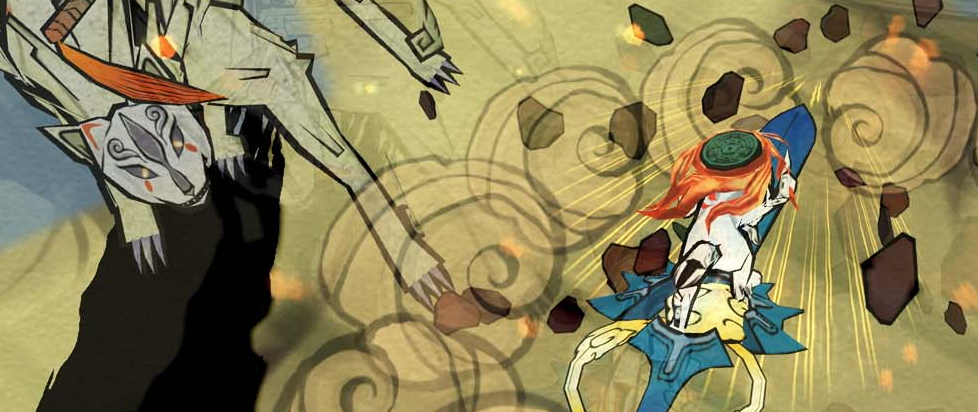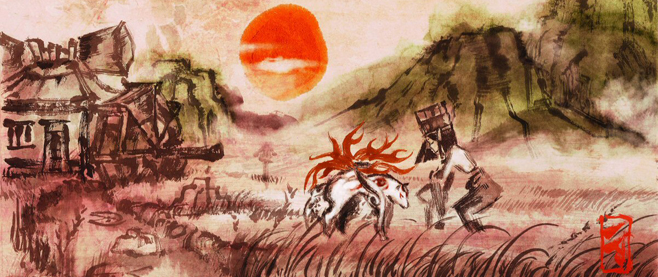
Art Divine
Sometimes the themes of a video game demand designers think differently about how it’s presented. That’s certainly the case with Okami, a game where you play as an avatar of a god as you fight to banish dark forces and bring peace back to the land. It also features a striking, cel-shaded art style that calls to mind great works of Japanese art. That last part is key, because it’s the very reason we can buy into the premise so easily: By casting Okami as a living, breathing, and moving piece of art, the mythical qualities of the premise not only shine through, but allow for some interesting gameplay wrinkles that make you feel like a god.
Okami gets compared to the famous woodblock print The Wave of Kanagawa all the time, and for good reason: Okami’s art style is clearly inspired by Wave’s, building an entire world around the expressive, exaggerated brush strokes found in the latter. But while it’s tempting to begin and end the conversation around Okami at its striking cel-shaded graphics does the style a disservice. What’s truly special about Okami is what it does with the graphical style, taking it and us to places that stretch the imagination and letting it bleed into the gameplay.
The art allows Okami to do some very fantastical settings justice. One of the most memorable sequences involves Amaterasu shrinking down to the size of a small mouse. The environment then becomes giant versions of everything, including blades of grass, spiders, and, most impressively, the feet of regular-sized people. This scene would look downright weird if the developers tried representing it in a more realistic style, but by stylizing everything, the rougher patches are easier to gloss over and you’re able to buy into the absurdity that much easier. And again, it captures the mythical quality of the scenario perfectly.
With an art style that calls to mind some of the most famous Japanese works of art, Okami uses Japanese mythology as a foundation for the game’s themes and audiovisual dressing. You play as Amaterasu, the Japanese god of the sun in wolf form, as you travel across Nippon defeating Japanese-themed evil such as the eight-headed serpent Orochi and a nine-tailed fox. The aesthetic matches the theme very well, which is to be expected given how they are inexorably tied.
Further reinforcing the art theme is the way everything in the game is framed as a print that’s still being made even as you’re playing it. Scene changes are marked by an unrolling scroll of paper. New enemy encounters are introduced with artfully drawn stills of them elaborately drawn as they would appear on an actual print. But the most significant element that ties into the artistry theme is the brush mechanic. At will, you can stop the world around you and turn it into a monochrome sketch with a brush hovering above it. While everything is in this state, you can draw on the screen to affect the world around you. In short, you’re literally creating things in the world as a god, and you can’t get more thematic than that.
Aside from the art, Okami’s known for being a game that’s structured much like The Legend of Zelda, flowing between exploring the world and dungeons filled with puzzles. The dungeons are fairly straightforward, with puzzles that aren’t too taxing and combat that’s somewhat toothless. But all the puzzles are solved using your brush skills, willing into being something connecting two points, or filling in a certain area to fix a broken environmental element. Each different dungeon is basically an unfinished work of art, and you’re filling in the unfinished areas to progress. Art and godhood intersect in a profound way.
Yes, a pretty art style can make a striking impression, but it can also be used to prop up the very core of what a game is. Okami casts you as a god, but the art is what makes everything feel divine and mythical. And the conceit of the art style – that you’re interacting with the world with your brush to affect change in the world, which is itself a piece of art – is what elevates Okami into a journey that’s divine in every sense of the word.




